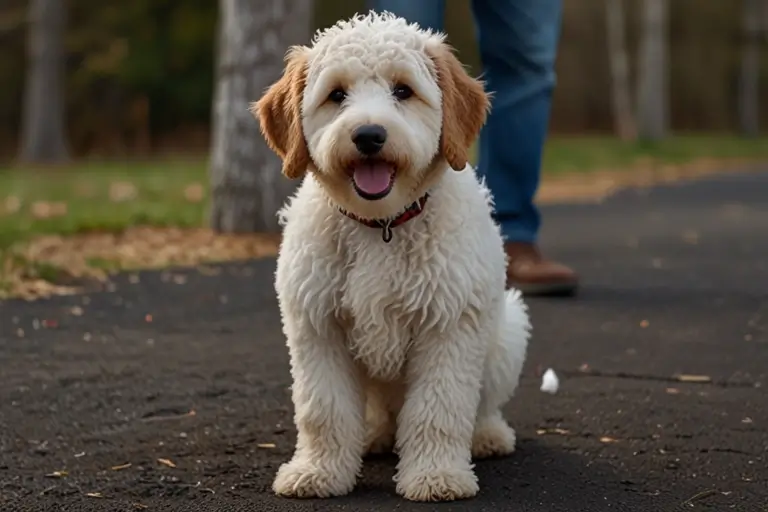Learn effective Pyredoodle Training tips to raise a well-behaved and happy companion.
If you’re thinking about adding a pyredoodle to your family, you’re making a great choice! This mixed breed dog, a cross between the Great Pyrenees and the Standard Poodle, is known for its friendly and affectionate temperament.
However, proper training and socialization are essential to ensure your pyredoodle becomes a well-behaved companion.
In this complete guide, we’ll explore the key aspects of pyredoodle training, grooming, and overall care to help you raise a happy and healthy pyredoodle dog.
Understanding the Pyredoodle Training
What is a Pyredoodle?
A pyredoodle is a large, intelligent dog breed that can stand between 20 to 32 inches tall and weigh 50 to 90 pounds. With a medium-length, wavy coat, they can vary in appearance, often combining the curly fur of the poodle with the fluffy double coat of the Great Pyrenees. These gentle giants are known for their affectionate nature and are often a beloved choice for families.

Parent Breeds
Great Pyrenees: Known for being loyal and protective, the Great Pyrenees is a working dog breed originally bred to guard livestock. Their calm demeanor and affectionate temperament make them great companions.
Standard Poodle: The Standard Poodle is one of the smartest dog breeds and is relatively easy to train. Their playful and energetic personality complements the pyre doodle’s character well.
Together, these traits create a dog that is both affectionate and intelligent, making pyre doodles excellent family pets.
Temperament and Personality Traits
Friendly and Affectionate Nature
Pyredoodles are known for their friendly and loving temperament. They thrive on human interaction and often form strong bonds with their families. This affectionate nature makes them great companions for both adults and children alike.
Eager to Please
One of the most appealing characteristics of the pyredoodle is its eagerness to please. This trait greatly assists in training, as they respond well to positive reinforcement techniques. Using treats and praise during training sessions can help you train your pyredoodle effectively.
Energy Levels and Exercise Needs
With their high energy levels, pyredoodles need plenty of exercise to stay healthy and happy. Regular walks, playtime, and mental stimulation are vital to prevent boredom and destructive behaviors. Activities like fetching a ball or agility training can keep your pyredoodle engaged and physically fit.
Training Your Pyredoodle
Starting Training Early
Starting training when your pyredoodle is still a puppy is crucial. Early training and socialization help your pup develop good manners and adapt well to various environments. Focus on basic commands like “sit,” “stay,” and “come” to build a solid foundation.

Training Techniques
Positive Reinforcement
Using positive reinforcement is one of the most effective training methods for pyredoodles. Reward your dog for good behavior with treats, praise, or playtime. This encourages them to repeat desired actions, making the training process enjoyable.
Consistency and Routine
Establishing a consistent training routine helps your pyredoodle understand expectations. Keep training sessions short and engaging, ideally around 5 to 10 minutes, to maintain their attention. Use the same commands consistently to avoid confusion.
Addressing Challenges
While pyredoodles are generally eager learners, they can also be stubborn at times. If you encounter challenges during training, remain patient and adapt your techniques. Understanding your dog’s behavior and adjusting your approach can lead to better results.
Socialization
Importance of Socialization
Socialization is key to developing a well-rounded pyredoodle. Proper socialization reduces fear and anxiety, helping your dog feel comfortable in different situations. A well-socialized pyredoodle is more likely to enjoy outings and interactions with other pets and people.
Activities for Socialization
To socialize your pyredoodle, take them to dog parks and community events. Interacting with other dogs and people helps them learn appropriate behaviors. Puppy training classes can also be a fun way for your pup to meet new friends.
Grooming Needs
Coat Care
Regular grooming is essential for maintaining your pyre doodle’s coat. Depending on their coat type, you may need to brush them at least once a week to prevent mats or tangles. During shedding seasons, more frequent brushing can help keep their coat healthy.
Regular Health Checks
Like all dogs, pyredoodles benefit from regular veterinary care. Schedule annual check-ups to monitor their health and address any concerns early on. Being prone to certain health conditions, including hip dysplasia and bloat, means that staying on top of your dog’s health needs is important. Also Read
Frequently Ask Question (FAQs)
What is the average lifespan of a Pyredoodle?
The average lifespan of a pyredoodle is around 10 to 12 years.
Are Pyredoodles hypoallergenic?
Yes, pyredoodles are often considered hypoallergenic, thanks to their Poodle heritage, which produces less dander.
How much exercise do Pyredoodles need daily?
Pyredoodles require at least an hour of exercise each day to keep them happy and healthy.
What are common health issues in Pyredoodles?
Common health concerns include hip dysplasia and bloat, so regular vet check-ups are important.
How can I find a reputable Pyredoodle breeder?
Look for breeders who provide health clearances for both parent breeds and are transparent about their breeding practices.
Conclusion
Training your pyredoodle can be a rewarding experience that strengthens your bond. With their friendly temperament, eagerness to please, and high energy levels, these dogs make wonderful companions when properly trained. By focusing on early socialization, consistency in training, and proper care, you can help your pyredoodle become a loving and well-behaved family member.










